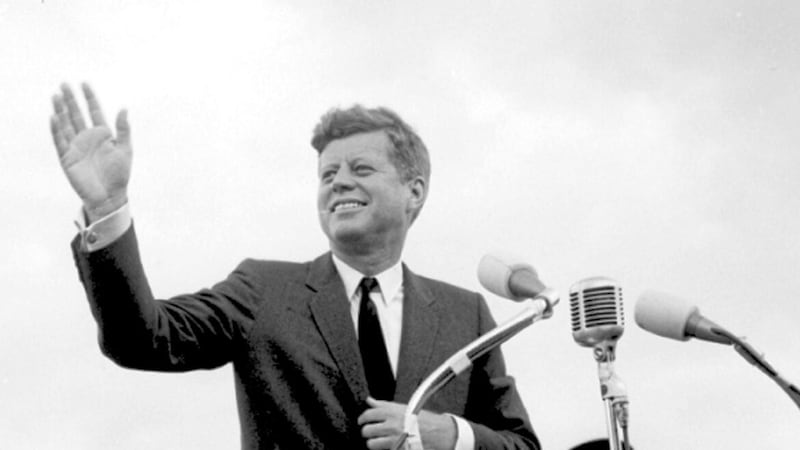THE controversial MP Enoch Powell famously said: "All political careers end in failure". It wasn't altogether true: some of them end in premature death.
Think of the former Japanese prime minister Shinzo Abe, who was shot and fatally wounded last Friday while delivering a speech in the city of Nara.
Think also of John F Kennedy and his tragic demise in Dallas, Texas, on November 22, 1963. A mere five months earlier, JFK visited the land of his ancestors where he received a tumultuous welcome from the Irish people, headed by their president, American-born Eamon de Valera. The New York-based website www.irishcentral.com last week recalled that, three years later in 1966, Dev, as he was widely-known, gave an interview in which he recalled feeling concern for Kennedy's safety as they travelled together in an open car from Dublin Airport to the city centre, on a sunny evening in June 1963. "I did think when he was coming in with me from the airport, he was standing up, and it did pass through my mind, curiously enough, what an easy target he would have been," he said in an interview for the John F Kennedy Presidential Library and Museum in Boston.
Looking back on the TV footage from the time, Kennedy was indeed standing up as the official car made its way through cheering crowds in the city centre and anyone located at a window overlooking the route could have taken a pot-shot at him. Of course, that was never going to happen in Ireland.
Another political leader who met a violent death was Pakistan's Benazir Bhutto, whom I met when she was on an official visit to Dublin as prime minister of her country in 1994. Thirteen years later, as leader of the opposition, she was brutally murdered in the course of an election campaign after she stood up in a car to wave to supporters.
As a student at Oxford in the mid-1970s, Benazir Bhutto became friends with another future prime minister, Theresa May, who took over from David Cameron in 2016. Three years later, May was succeeded by Boris Johnson whose own time in office is now coming to an end.
Johnson led the United Kingdom out of the European Union and agreed the Northern Ireland Protocol in the process. That was intended to avoid a "hard border" on land but has instead created an "Irish Sea border" which many unionists believe is undermining the north's place in the UK. George Parker of the Financial Times has suggested that, if either Rishi Sunak or Tom Tugendhat succeeded Johnson, they would be likely to seek a resolution of the protocol stand-off with the EU. Some of the other contenders are less conciliatory and the Brexit drum will be beaten loudly during the leadership contest.
You wouldn't call British politics an inspiring spectacle at the moment but there is one aspect that has to be commended, namely the diversity of ethnic backgrounds at the highest level. In addition to the aforementioned Rishi Sunak, think of Sajid Javid, Nadhim Zahawi, Priti Patel, Kwasi Kwarteng, Alok Sharma, James Cleverly and current Northern Ireland secretary, Shailesh Vara.
It reflects positively on British society that so many people of Black, Asian and Minority Ethnic (BAME) backgrounds have risen to the top. Contrary to the dire warnings of Enoch Powell in his "Rivers of Blood" speech in 1968 about immigration, the world hasn't fallen apart: au contraire, as our Parisian friends would say.
Meanwhile in Dublin, as I write, the government is facing a no-confidence motion in the Dáil, proposed by Sinn Féin. Even if, as has been forecast, the ruling coalition of Fianna Fail, Fine Gael and the Greens manages to survive, it looks as if the next general election will take place earlier than the current administration might wish. But as Boris Johnson would say: "Them's the breaks."
The mood in Fianna Fáil hasn't been good of late. In most of the opinion polls published since the February 2020 general election, they are in third place, with Fine Gael usually second and Sinn Féin on top in every survey conducted between July last year and the first of this month. There seems to be a growing view among voters that the "establishment" parties like FF or FG can't cope with the current economic difficulties and there is an increasing willingness to take a chance on Mary Lou McDonald and her team.
The challenge for Sinn Féin in government would be to live up to expectations.
Email: DDebre1@aol.com; Twitter: @DdeBreadun








